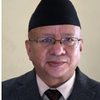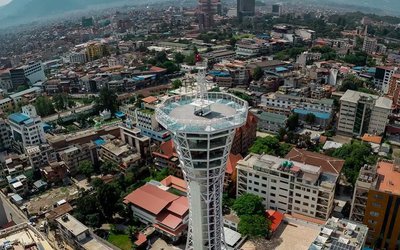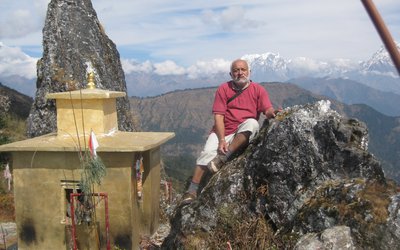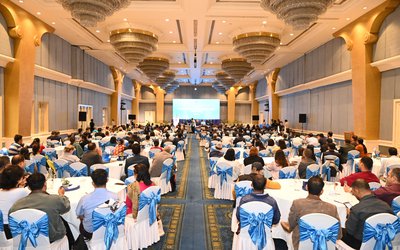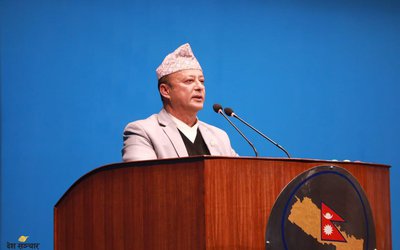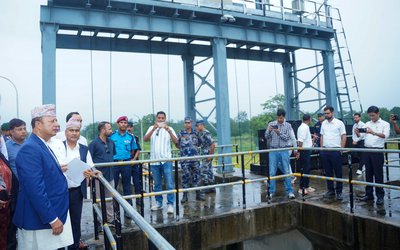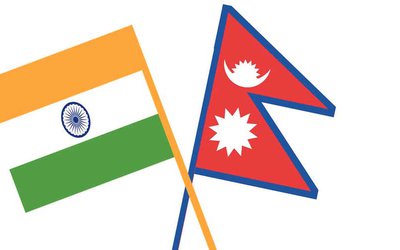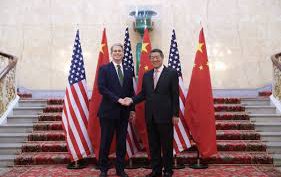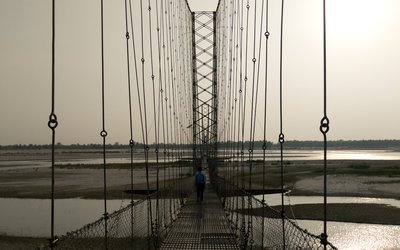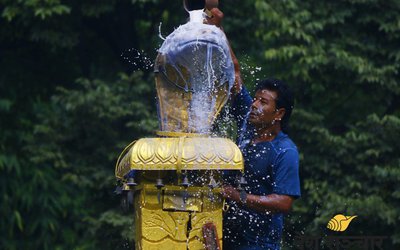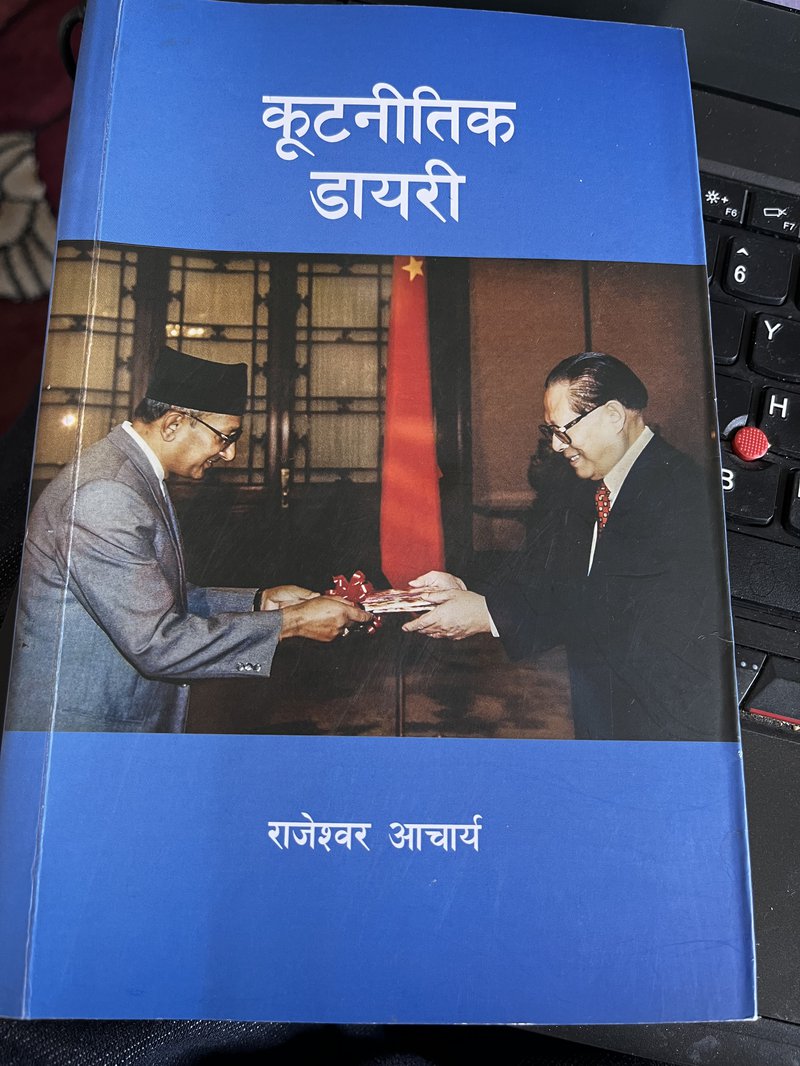
My respected brother and former campus chief of Dhankutta Campus and founding member of SOLVE- an NGO dedicated to developemnt and former President of the same oraganisation, Narayan Joshi asked me to read this book and give some notes, so I have decided to write it. Looking at the title of the book at a glance, I was confused that the book focuses only on diplomacy, but it contains his complete autobiography, including a photocopy of his appointment letter from the RBB. Therefore, this is his autobiography and most of it is related to China, looking at it at a glance, I found that my closeness with him was around 2032 when he left his job, during the Panchayat period, around 2032, with Birendra Bhakta and Sahana Pradhan of Indra Chowk, etc.
Later, the meetings became rare and perhaps he too forgot, but I have not forgotten him.
The book 'Diplomatic Diary' by former Nepali Ambassador Rajeshwor Acharya, covering various topics in the diplomatic field, including Nepal-China relations, was published in 2079 BS. Former Ambassador Acharya released his diplomatic diary on the occasion of BP Koirala's return to Nepal in 2033 BS, risking his life to pursue a policy of reconciliation. This also shows his respect, loyalty, and great faith and support for BP Koirala's policies of democracy, socialism, and nationalism.
It is not an easy task for Acharya, who has an economic background, to be an ambassador in a diplomatic capacity, especially in a huge country like China, when the Nepali Congress is in power. But it is felt that he has fulfilled that role with a sense of responsibility, commitment and the sense of diplomacy .
Commentator ,in the process, Dhrub Hari Adhikari writes in a style that secrecy is of great importance in diplomacy and that it must be taken into account, which seems to have a double meaning.
The mention of China's "nip in the bud" policy, that is, not allowing opposition and problems to sprout, is interesting. In addition, what he wrote... "There, people sleep at night but the government does not sleep" is very message-filled, which can be a great inspiration for a country like Nepal and its state apparatus.
Taking notes of what is done during meetings with ambassadors and implementing it gradually is an important aspect of China's development, says Acharya.
In the book, he has clearly included in the work the issues he saw, experienced regarding bilateral meetings, discussions, cooperation and agreements related to developing Nepal-China relations while in China. The book covers various topics such as diplomatic travel, experience and understanding of China, the rise and influence of Mao, the One China policy, concerns about Kalapani, concerns about the transit treaty, King Birendra's visit to China, Chinese Prime Minister Zhu Rongji's visit to Nepal, and economic diplomacy and the trend of seeking.
Since China and India are neighboring countries of Nepal, it would have been even more interesting if there had been some discussion about China's perspective on India and bilateral relations.
It is also mentioned that he was the ambassador to China from 2055 BS to 2059 BS. Former Ambassador Acharya has dedicated his book to the late King Birendra and the first people's elected Prime Minister, the late BP Koirala, and has included photos of both of them, which also shows his faith in BP.
He attributes the opportunity to work as a representative of two kings and five governments during his four years in Beijing to the instability in the country.
Nepal is one of the 14 neighboring countries that share a border with China. China and Nepal, which believe in peaceful diplomacy, have had friendly relations for centuries.
His appointment as ambassador, meeting with King Birendra, opening the road to Syafrubeshi, the king's suggestion not to make light comments about China, etc. are interesting to read and the presentation is also detailed and does not hide anything.
He presented the certificate of office to Chinese President Ziang Zemin, later on, looking at China's internal affairs such as the rise and influence of Mao, the rise of the Deng era, etc., although it seems like he is trying to deviate from the topic, later on, Nepal's one-China policy, agriculture, etc., has effectively written about what Nepal can learn from China.
The draft of the transit treaty, as an ambaasador to Mongolia and North Korea, mention the relations between the neighboring countries. The possibility of a "seabuckthorn " with King Birendra is interesting and as far as I know, I remember that ICIMOD first conducted a study with the support of UNDP in 1992.
There is a very detailed and interesting presentation about King Birendra's visit to China in 2001. But more than necessary it was detailed, like giving Birendra 5-7 minutes to speak at the Boao Conference, taking photos, etc.
It was interesting to read, but it didn't seem to be relevant. He has also written a short story about the palace massacre. He has written it with "unfortunate" titles like "The tray cracked and burst", etc.
It was interesting to read that part, but some might also have an opinion that it would have been better if it had not been written? There are photos - but the layout is not as attractive as the level of meeting with the personalities.
Chapter 2 is called, but it should be Section 2, and it contains a list of “high-level visits during my tenure”. Chapter 3 is titled “Meeting with Chinese Friends”.
Chapter 4 contains his family and his struggle stories. Chapter 5 talks about the obstacles in his teaching career in 2032 BS. The appendix contains a photocopy of his appointment.
He also mentioned India’s interest in the new border. There are also those who believe that it is natural for Nepal’s neighboring countries to be interested in it.
The idea that countries like Nepal should understand China’s concept and be able to protect their national interests by making policy adjustments is reflected in many places.
The book includes some topics and facts related to Mongolia and North Korea. The articles included on maintaining balance with neighbors while keeping national interests supreme and adhering to world peace and international law have made the work meaningful.
In the title of Experience and Understanding of China, author Acharya mentions that everyone, including the Chinese leadership, strictly adheres to time, all work and meetings are held on time, and public transportation by air, rail, and bus is very organized. This is not a new presentation; most people who have been to China have already experienced it.
He mentioned that China has invested heavily in research and development, and their emphasis is especially on developing knowledge, skills, and personality in students. They have also made us realize the need to maintain a balance with our neighbors and work in our national interest.
This book provides ample reading material for those who believe that everyone should learn and gain knowledge from Chinese leaders on high-level etiquette and humanitarian aspects.
The writing in this 331-page book is fluent, the subject matter is also of a high standard, and from that point of view, this book is readable and collectible.
In the era of AI, if a new generation of audio and digital copies were also available and published in multiple languages, its usefulness would increase even more.
It is clear that China has always looked at Nepal with respect, despite the political turmoil in China, Nepal's northern neighbor.
It would not be an exaggeration to say that the present book, Diplomatic Diary, is informative and valuable for readers who want to learn about Nepal-China relations and overall diplomacy.
Overall, the book is good, but it would have been better if it had been more concise, taking into account the reader's time and interests.
This is a great book for those who have time and interests. Rajeshwar Acharya has not skimped on anything, and I personally feel that this is a book that is easy to understand overall. Congratulations and best wishes, Ambassador Rajeshwar Acharya Sir!!!
- Susan's “U-Turn” From Atheism To Spirituality And Superstition: Some Considerations
- Jun 29, 2025
- Banker And Businessman Being The Same Person: How Practical, How Impractical
- Jun 01, 2025
- 2082/83 Policy And Program: Presentation New, Short But Not Exciting
- May 07, 2025
- Nepal's Capital Market: Some Analysis
- May 02, 2025
- Nepal’s recent Economic Growth: Critical observations ?
- Apr 12, 2025
